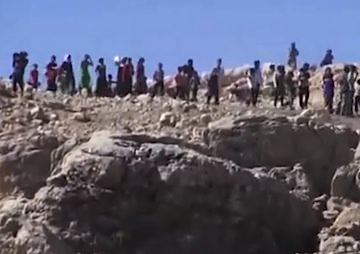Iraq Roundup: Al-Maliki’s Ouster, ISIS’ Onslaught and America’s Airstrikes
As of Tuesday, longtime Iraq Prime Minister Nouri al-Maliki was on his way out, as the long-term outcome for his divided country seemed troubled at best. Displaced Iraqi Yadizis seek refuge in northern Iraq. Screen shot from The Guardian
Displaced Iraqi Yadizis seek refuge in northern Iraq. Screen shot from The Guardian
As of Tuesday, longtime Iraq Prime Minister Nouri al-Maliki was on his way out, as the long-term outcome for his divided country seemed troubled at best.
Iraq has not followed the script that the architects and supporters of the U.S. invasion and occupation created since the Bush II era, and now the volatile nation has again become a hot spot for American military action.
Here’s a rundown of some recent developments in Iraq:
The U.S. sent fighter jets and drones as part of a new campaign in Iraq against the Islamic State in Iraq and Syria (ISIS), and in the early hours Sunday, began a series of airstrikes that destroyed vehicles and artillery belonging to the radical Islamist group. According to The Guardian, the objective was to free tens of thousands of Iraqi Yazidis who are being held hostage on a northern mountain near the town of Sinjar.
Last week, 40,000 Iraqis were stranded on the mountain, unable to leave due to the death threats from ISIS and lacking sufficient supplies to survive.
ISIS was formed by an extreme sect of Sunni jihadists who have targeted Iraqi and Kurdish minorities since the U.S.-led invasion of Iraq in 2003. They consider Yazidis to be devil worshippers, and as one of the villagers interviewed by The Guardian put it, Yazidis “are being told to convert or lose our heads.”
According to Mohammed Shia al-Sudani, Iraq’s human rights minister, ISIS militants have killed at least 500 members of Iraq’s Yazidi minority. Some of these victims were buried alive, al-Sudani said, including women and children, and about 300 women were captured as slaves.
This interactive map from The New York Times traces ISIS’ movements in Iraq and Syria since 2013.
ISIS forces have seized five oil fields and three cities along an 800-mile section of Iraq near Syria. ISIS’ territorial gains have given the Sunni extremists control over much of central Iraq. Meanwhile, Iraq’s weak military has been unable to push back effectively, and Kurdish officials have also claimed they are outgunned by ISIS.
ISIS has been able to grow its numbers by connecting with Iraq’s Sunni population who have felt marginalized by the Shiite government. Dr. Hisham al-Hashimi, an Iraqi expert on ISIS, told The Guardian that there are now 30,000 to 50,000 members and that 30 percent of those are “ideologues,” while the rest were coerced or joined out of fear. In the same article, another expert weighed in with his read on the worsening situation:
“Iraq is spiralling out of control,” said Ali Khedery, the former longest-serving US official in Baghdad. “The centrifugal forces are spinning so quickly. They are on one timeline and Washington is on another. I am beyond concerned.”
Khedery, who reported to five US ambassadors and three US central command generals and is now chairman of the Dubai-based consultancy Dragoman Partners, said: “Everybody is retreating to their corners. And there is no credible international actor that I can see that is trying to bring it together again.
“It definitely is an existential threat to the Iraqi government and I think it represents yet another manifestation of the disintegration of Iraq as we know it.
“Iranian overreach, the genocide in Syria, [Nouri] al-Maliki’s consolidation of power in a very sectarian way, have all led to the disillusionment, the disenfranchisement of the Sunni Arabs, who have fatally, but perhaps understandably, chosen to consummate a deal with the devil. Now we are locked in a race to the bottom.”
On Sunday, Kurdish forces, with airborne support from the U.S., were able to take back the towns of Guwair and Makhmur in northern Iraq. As of Sunday, at least 20,000 of the Iraqis stranded on the mountain were able to escape after U.S. airstrikes.
But the effectiveness of these airstrikes in diminishing ISIS’ stronghold on Iraq seems to be minimal, according to recent statements by the Pentagon.
Some 30,000 people escaped to Syria, where they were then escorted to Iraqi Kurdistan by Kurdish forces. The U.S. is slated to provide light weaponry to the Kurds through the CIA.
But arming the Kurds could lead to more problems due to the fact that some Kurdish factions hope to split off in northern Iraq. These potential separations in different parts of the country could result in additional disagreements over contested areas, multiethnic cities and oil holdings. The Peshmerga had already taken over disputed areas as of last June, and the Kurds now control the city of Kirkuk, located about 150 miles north of Baghdad.
As of Tuesday, al-Maliki appeared to be out of a job, and Haider al-Abadi, who currently has widespread support from the U.S., Iran, Saudi Arabia and NATO, seemed likely to take his place. Al-Maliki’s departure, and the possible measures required to remove him, might spark Shiite infighting — yet another cause for division in an already unstable political landscape.
— Posted by Donald Kaufman
Your support matters…Independent journalism is under threat and overshadowed by heavily funded mainstream media.
You can help level the playing field. Become a member.
Your tax-deductible contribution keeps us digging beneath the headlines to give you thought-provoking, investigative reporting and analysis that unearths what's really happening- without compromise.
Give today to support our courageous, independent journalists.






You need to be a supporter to comment.
There are currently no responses to this article.
Be the first to respond.